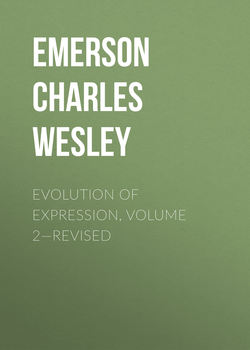Читать книгу Evolution of Expression, Volume 2—Revised - Emerson Charles Wesley - Страница 11
CHAPTER I.
SLIDE
UNWRITTEN MUSIC
Оглавление1. There is unwritten music. The world is full of it. I hear it every hour that I wake; and my waking sense is surpassed sometimes by my sleeping, though that is a mystery. There is no sound of simple nature that is not music. It is all God's work, and so harmony. You may mingle, and divide, and strengthen the passages of its great anthem; and it is still melody, – melody.
2. The low winds of summer blow over the waterfalls and the brooks, and bring their voices to your ear, as if their sweetness were linked by an accurate finger; yet the wind is but a fitful player; and you may go out when the tempest is up and hear the strong trees moaning as they lean before it, and the long grass hissing as it sweeps through, and its own solemn monotony over all; and the dripple of that same brook, and the waterfall's unaltered bass shall still reach you, in the intervals of its power, as much in harmony as before, and as much a part of its perfect and perpetual hymn.
3. There is no accident of nature's causing which can bring in discord. The loosened rock may fall into the abyss, and the overblown tree rush down through the branches of the wood, and the thunder peal awfully in the sky; and sudden and violent as their changes seem, their tumult goes up with the sound of wind and waters, and the exquisite ear of the musician can detect no jar.
4. I have read somewhere of a custom in the Highlands, which, in connection with the principle it involves, is exceedingly beautiful. It is believed that, to the ear of the dying (which just before death becomes always exquisitely acute,) the perfect harmony of the voices of nature is so ravishing, as to make him forget his suffering, and die gently, as in a pleasant trance. And so, when the last moment approaches, they take him from the close shieling, and bear him out into the open sky, that he may hear the familiar rushing of the streams. I can believe that is not superstition. I do not think we know how exquisitely nature's many voices are attuned to harmony and to each other.
5. The old philosopher we read of might not have been dreaming when he discovered that the order of the sky was like a scroll of written music, and that two stars (which are said to have appeared centuries after his death, in the very places he mentioned) were wanting to complete the harmony. We know how wonderful are the phenomena of color, how strangely like consummate art the strongest dyes are blended in the plumage of birds, and in the cups of flowers; so that, to the practiced eye of the painter, the harmony is inimitably perfect.
6. It is natural to suppose every part of the universe equally perfect; and it is a glorious and elevating thought, that the stars of Heaven are moving on continually to music, and that the sounds we daily listen to are but part of a melody that reaches to the very centre of God's illimitable spheres.
N. P. Willis.
